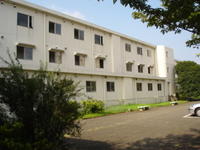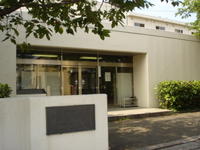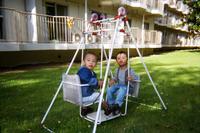Count my blessing : being a homemaker in Yokohama
In my previous post I moaned about being away from my home country, deprived from my favorite corners in Jakarta, leaving some good and nice people, etc. Today, I swear I will live for today ; meaning that there are things I should cherish.
Let's start from our dorm.
In my previous post I moaned about being away from my home country, deprived from my favorite corners in Jakarta, leaving some good and nice people, etc. Today, I swear I will live for today ; meaning that there are things I should cherish.
Let's start from our dorm.
 Foreign Student House at Gumyoji (Gumyojino Ryuugakusei Kaikan) belongs to Yokohama National University.
Foreign Student House at Gumyoji (Gumyojino Ryuugakusei Kaikan) belongs to Yokohama National University. 
We live in a family room-- two bedrooms connected by rolling door, a living room, a kitchen and a bathroom.
 We can sleep on the bed (don't laugh, because if you live in "real" Japanese apato, you will have to live on the futton on the floor), put our clothes in the cupboard with hangers and shelves (this should not be funny as original Japanese is actually a big compartment to put everything in: clothes, bags, futton-- like doraemon's bag, everything is there!)
We can sleep on the bed (don't laugh, because if you live in "real" Japanese apato, you will have to live on the futton on the floor), put our clothes in the cupboard with hangers and shelves (this should not be funny as original Japanese is actually a big compartment to put everything in: clothes, bags, futton-- like doraemon's bag, everything is there!)
a bathroom which has a tiny Japanese bathtub, washtafel, w.c and shower (this is also essential as in ordinary Japanese apato, the bathroom is separated from the w.c which is actually not really child-friendly for you have to use toilet paper not water and soap to wipe your children's rear part after using the toilet)
a living room with dining table and chairs plus an office desk (why? Japanese have a very short table on the floor and we have to sit crossed leg and our feet get numb all the time).Not fancy, but suits our needs.

We also have a kitchen.
 Not big, but having two pit stoves is essential to me!! Kitchen sink, kitchen cabinets, refrigerator, microwave, magic jar, electrical thermos,toaster... hmm..life is not that hard!
Not big, but having two pit stoves is essential to me!! Kitchen sink, kitchen cabinets, refrigerator, microwave, magic jar, electrical thermos,toaster... hmm..life is not that hard!In our dorm, we have public washing machines and driers.

When my children are taking a nap, I usually sneak out to put the clothes in the washing machine for 30 minutes (100 yen) and another 20 minutes (100 yen) for the drier. By the time my children are awake, voila... All the clothes are clean. I don't have to iron the clothes, that's also a good thing. My clients never complain.
There is a green garden behind our room. Wisnu can play the swing and run around chasing the butterfly or scream to let off the steam.

Across our dorm, there is a community center (chiku senta). On the second floor, there is a library. Eventhough the books are in Japanese, but they surely have many good children books. At least I can show Wisnu the pictures and tell the story in our own words. On the third floor, there is an airconditioned play room with many toys -- we can take our children to play there for free. There is also a big hall where many children can play with abundant and various toys for free twice a month.
The community center has lots of programs: Japanese cooking class for foreigners, pilates, activities for senior citizens like table tennis, Japanese chess, cooking, etc the program you join din, they usually provide volunteers to take care of your children for free so you can have a good time there.
Another good thing in Yokohama : public transportation.
First, subway.

They have a special car for women only for 07.00-09.00 when the train is very crowded. They also have special seats for senior citizens, pregnant women, people with children. They are, of course, on time. No pickpocket. No musicians. Children are free of charge. There are lifts/escalators in almost every station, so you can push your stroller and carry your baby in your arms--like me.
Second, buses.

Only 210 wherever you go. Children are free of charge.On time, always. Safe and comfortable, like the subway.
Another good point is your welfare is guaranteed. Some stuffs are expensive here, but the ward office give us financial aids.
1. Child allowance ; 5,000 yen a month per child
2. Vaccination is for free, too.
3. Delivering a baby: since we are no-income citizen, I was exempted from the delivery expenses which the actual cost is 380,000 yen.
Ward office has a special program once a month for foreign ladies. Last month, we learned how to wear yukata and this month was about making a paper craft--not origami--I forgot the name.
I should also mention the public facilities here. If you need to go to the public toilet, usually they have a child seat for your child to sit while you are using the toilet. (I'll upload the photo as soon as I can get one).
From the book I'm reading now, I will have to agree with the statement:
Life is difficult.
Once we truly know, understand and
accept that life is difficult,
then life is no longer difficult.
(M. Scott Peck, M.D)
1 comment:
Post a Comment